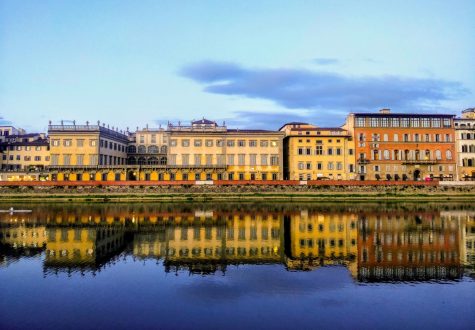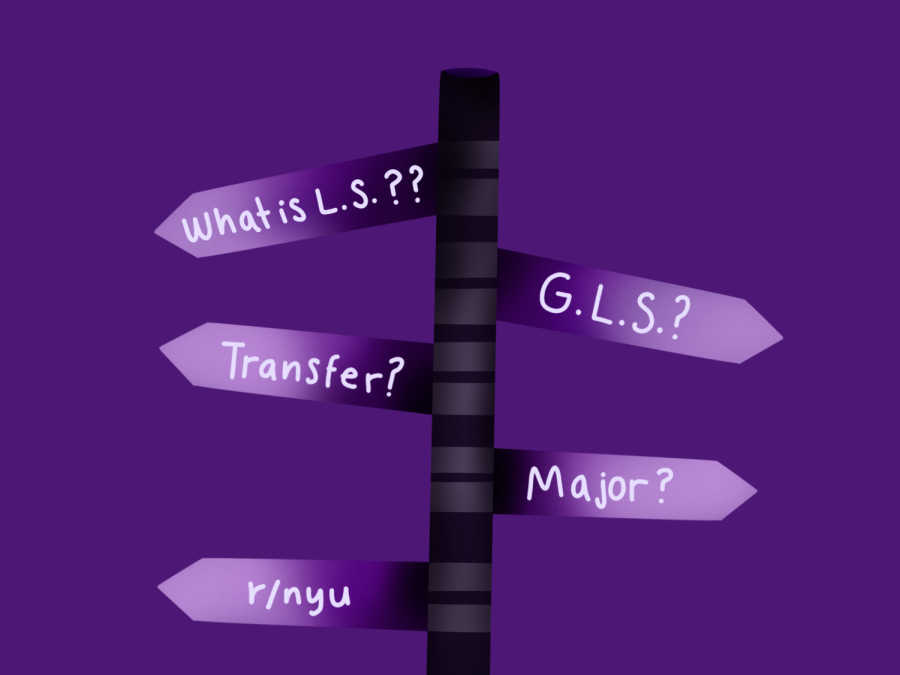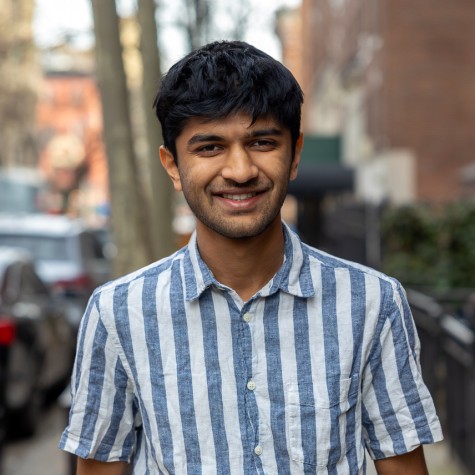The case for Liberal Studies
One Liberal Studies first-year on the program that so many newly accepted NYU students find themselves in.
(Staff Illustration by Susan Behrends Valenzuela)
April 18, 2022
On Dec. 15 of my senior year of high school, I opened an acceptance letter to the school of my dreams: NYU. “Congratulations” jumped out of the phone screen. I rejoiced, but didn’t fully read the letter until a few moments later, after wiping away my tears of relief. It took a few scans of the email to understand my circumstances. I hadn’t been admitted into my first school of choice, the College of Arts & Science, with a political science major. Instead, I had been accepted into something called the Liberal Studies Core program and would be spending my first year abroad at NYU Florence. Overwhelmed and confused, questions circled my mind: What is Liberal Studies? Was I in a good position?
No amount of online research offered me assurance. I had read Reddit posts about how LS is extremely restricting and even a trap, yet I also watched YouTube videos where students claimed that it gave them the freedom to explore their interests and the world.
From what I could gather from NYU’s official Liberal Studies website, LS is a two-year liberal arts curriculum that acts as a foundation for students to explore their interests before they declare a major at the end of their sophomore year. It provides access to smaller classroom sizes, an interdisciplinary curriculum and more popularly known, easy access to study abroad experiences. The goal of the Liberal Studies Core is to immerse students in another culture where they can apply the skills and knowledge attained within the walls of their classrooms.
I am in my second semester at NYU, finishing up my first year in LS. Not all LS first-years are offered the chance to study abroad, and I was very excited at the prospect of living in Europe. My time at the Florence campus consisted of a tight-knit community with intimate classes which focused on global history, art, Italian and writing, and peers with diverse interests.
Living in Italy has opened my eyes to a new culture. Since I am required to take Italian at NYU Florence, I had the pleasure of using it on a day-to-day basis on my trips into town. In addition, I got to know a great deal of the student body and staff — which may have been overwhelming had I spent my first year in New York City.
In the city of Florence, which is credited for its art and history, I had the chance to see first-hand much of what I learned in class. The Uffizi Gallery, the Cathedral of Santa Maria del Fiore, the Medici Riccardi Palace and other historical monuments were a mere bus ride away. Without LS, I would not have been exposed to Italian culture the way I am today.

Unlike when I had applied to NYU, I now plan on exploring a career in entertainment. This change in course came from meeting so many people like me in the program who did not have a set academic plan — we were all open to whatever inspired us. Until recently, I did not know what I wanted to major in or what my interests truly were. I’ve since decided to major in English with a double minor in producing and dramatic literature. Today, it is a dream I am actively working toward, and I am excited to see what awaits me.
While my experience with LS has been positive so far, not every student in the program feels the same way. Many feel like they are stuck taking classes they don’t enjoy. Since four semesters are required, students must complete these years before they may transfer to another school — unless they choose to stay, in which case they would be placed in Global Liberal Studies, a bachelor’s program.
Considering that many majors and programs outside of LS have prerequisites for admission, this can make being in the program frustrating. Since very specific classes are required to fulfill core requirements, it may be time and energy consuming for students who aim to pursue majors outside of the program. While I do like LS, I will admit that certain required classes have controlled my schedule and restricted me a bit.
Like many things in the world of education, LS has its pros and cons for me. The small, seminar-style classes allowed me to make friends and get to know my professors, which have better connected me to my lessons and community. In particular, I really enjoyed my Writing to Exploration course. Because the class was so small, we were able to share our “free-writings” with each other every class. LS courses offered me room to express myself and be creative with my peers. On the flip side, there are mandatory classes we need to fulfill in order to transfer out of LS at the end of our sophomore year. I think that if a class can’t fulfill a requirement for many majors, it should not be obligatory.
LS works for some people and not others. Whatever your intended major is, LS can still offer a proper education in a grander scheme. During my time in LS, I have taken interesting classes, met knowledgeable professors, saw European architecture first hand, discovered myself and explored the world. It has acted as a match which sparked my interest in the arts.
If I can offer any advice to incoming students or current students, it is to just enjoy LS as much as possible. When I had first been admitted, it felt like I was in the wrong place, and I just wanted to work toward my major as soon as possible. It is not until recently that I realize my time in LS has given me the experience I needed to make decisions about my future.
Contact Mellak Abduelal at [email protected].

























































































































































